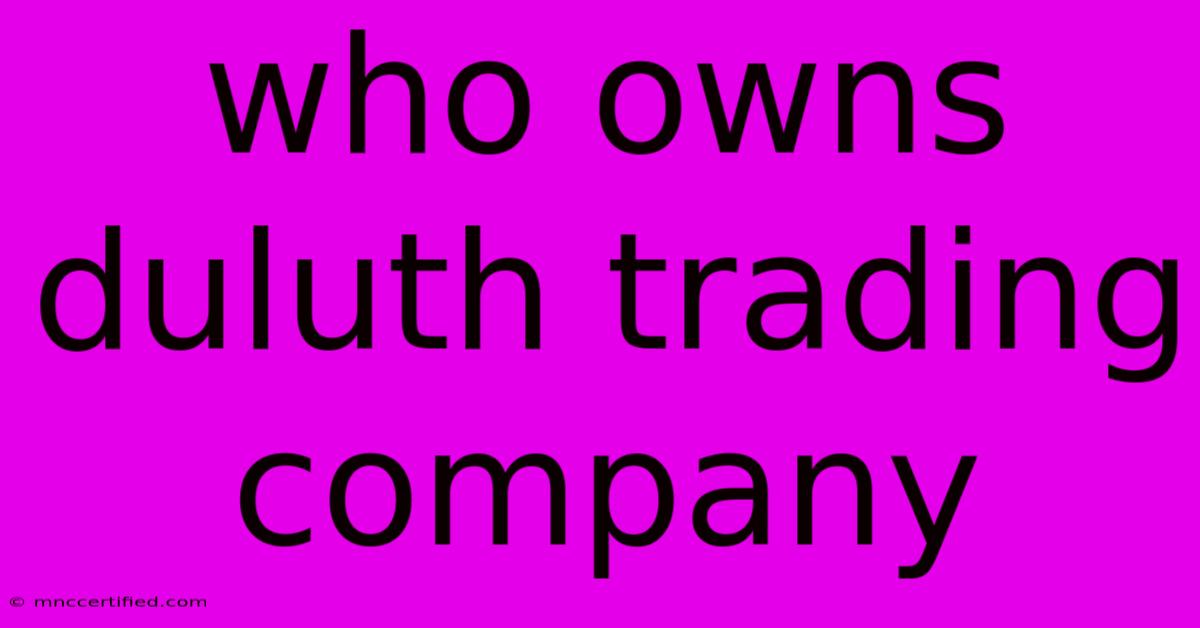Who Owns Duluth Trading Company

Table of Contents
Who Owns Duluth Trading Company? Unpacking the Ownership Structure
Duluth Trading Company, known for its rugged and durable workwear, has become a popular choice for consumers seeking high-quality, long-lasting apparel. But who's behind this successful brand? Understanding the ownership structure of Duluth Trading is key for investors, consumers, and anyone interested in the company's future. This article will delve into the intricacies of Duluth Trading's ownership, addressing common questions and providing a clear overview.
From Humble Beginnings to Public Company: Tracing the Ownership
Unlike many privately held companies that maintain a secretive ownership structure, Duluth Trading Company's ownership is relatively transparent, at least since its IPO. The company went public in 2015, meaning its shares are traded on the New York Stock Exchange (NYSE) under the ticker symbol DLTH. This means a significant portion of the ownership is now distributed amongst public shareholders. This includes institutional investors, mutual funds, and individual investors like yourself.
Pre-IPO Ownership: A Private Affair
Before its initial public offering (IPO), the ownership structure was significantly different. While precise details of the pre-IPO ownership are not readily available in the public domain, it's known that the company had a mix of private investors and possibly even family members involved. This period of private ownership allowed for strategic growth and development without the scrutiny of public markets. However, going public brought access to significant capital and broader investor interest.
Understanding Public Ownership: Stock Market Dynamics
The shift to public ownership fundamentally changed the landscape of Duluth Trading Company's structure. Now, no single entity or individual controls a majority stake. Instead, ownership is fragmented amongst numerous shareholders, large and small. This dispersed ownership structure limits the influence any single entity can exert on the company's strategic direction.
Impact of Public Ownership on Company Decisions
The decision-making process within a publicly traded company like Duluth Trading is influenced by several factors, including:
- Shareholder interests: The board of directors is responsible for acting in the best interest of all shareholders. This often translates to a focus on maximizing shareholder value through profitability and growth.
- Market forces: The stock price reflects investor sentiment and market conditions. Positive market performance and strong financial results often lead to a higher stock price, benefiting all shareholders.
- Regulatory compliance: As a public company, Duluth Trading is subject to strict regulations and reporting requirements, ensuring transparency and accountability.
Key Takeaways: Who Really Owns Duluth Trading?
In short, the answer to "Who owns Duluth Trading Company?" is: its shareholders. These shareholders range from large institutional investors to individual retail investors who own shares of the company's stock. The democratized ownership structure, typical of publicly traded companies, ensures broader participation in the company's success. However, no single individual or entity holds controlling power.
Further Research and Resources
For those interested in learning more about the specific ownership distribution of Duluth Trading, reviewing the company's SEC filings (available on the SEC's EDGAR database) is highly recommended. These filings provide a detailed breakdown of shareholders and ownership percentages. Analyzing these documents will provide a more in-depth understanding of the intricate landscape of Duluth Trading Company's ownership. You can also find information on the company's investor relations page on their website.
This information is for general knowledge and should not be considered financial advice. Always conduct thorough research and consult with a financial advisor before making any investment decisions.

Thank you for visiting our website wich cover about Who Owns Duluth Trading Company. We hope the information provided has been useful to you. Feel free to contact us if you have any questions or need further assistance. See you next time and dont miss to bookmark.
Featured Posts
-
Menendez Case Joint Hearing After Decades
Nov 26, 2024
-
Del Reys Uk Stadium Tour Dates Announced
Nov 26, 2024
-
Luxor Homes And Investment Realty
Nov 26, 2024
-
Isekai Rondo Accident Insurance
Nov 26, 2024
-
Rhea County Insurance Dayton Tn
Nov 26, 2024